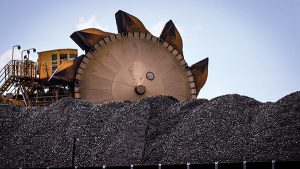Bloomberg
Chinese bureaucrats are discussing plans to resume some imports of Australian coal after a more than two-year ban as relations between the nations improve.
The National Development and Reform Commission (NDRC) held talks on proposals to allow four major importers — China Baowu Steel Group Corp, China Datang Corp, China Huaneng Group Co and China Energy Investment Corp — to make new purchases this year, according to people familiar with the matter, who requested anonymity to
discuss private details. Imports could resume as soon as April 1, two of the people said.
The NDRC didn’t immediately respond to a fax requesting comment. China Baowu, Datang, Huaneng and CEIC also didn’t immediately respond to requests for comment.
China, previously a major consumer of coal from Australia — among the world’s top shippers — implemented an unofficial ban in late 2020 as hostilities between Canberra and Beijing escalated over issues including a call for an independent probe into the origins of the coronavirus.
Exporters including Whitehaven Coal Ltd and Yancoal Australia Ltd jumped on the news, while China-based producers such as Shanxi Coking Coal Energy Group Co and Yankuang Energy Group Co tumbled on the prospects of increased supply. The Australian dollar extended its gain, climbing as much as 2.3% to 68.79 US cents, its biggest advance since November 10.
Foreign Minister Penny Wong travelled to Beijing in December for the first official visit in years, while Australian officials have
indicated the country would be willing to reconsider its case against China at the World Trade Organization if Beijing’s restrictions were lifted.
Authorities in China previously studied a potential easing of the restrictions on Australian coal, people familiar with the talks said at the time. Bureaucrats have been aiming to prevent any repeat of widespread power shortages in 2021 and more limited outages late last year. There are also concerns that European-led restrictions on Russian energy could boost competition for coal from China’s key suppliers like Indonesia.
Australia’s exporters have already switched focus to markets elsewhere in Asia and Europe amid an energy crisis that’s intensified global competition for the commodity, potentially limiting the impact of any policy
reversal by China.
 The Gulf Time Newspaper One of the finest business newspapers in the UAE brought to you by our professional writers and editors.
The Gulf Time Newspaper One of the finest business newspapers in the UAE brought to you by our professional writers and editors.
